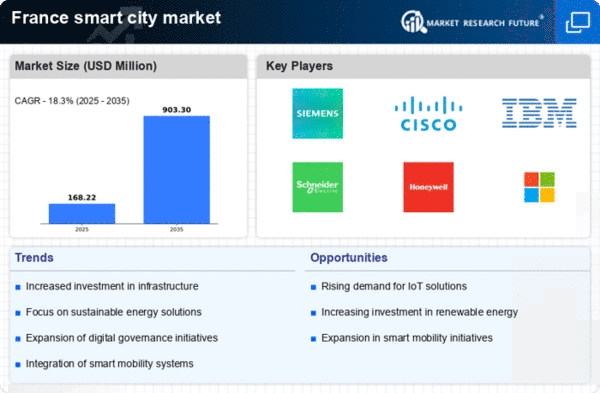Rising Urbanization
France is experiencing a notable trend of urbanization, with over 80% of its population currently residing in urban areas. This demographic shift is propelling the demand for smart city solutions to address challenges such as traffic congestion, waste management, and energy consumption. The smart city market is poised to benefit from this urban growth, as cities seek to implement advanced technologies to improve the quality of life for residents. The increasing population density in metropolitan areas necessitates innovative approaches to urban planning and resource management. Consequently, the smart city market is likely to expand as municipalities invest in smart infrastructure and services to accommodate the needs of their growing populations.
Technological Advancements
The rapid pace of technological advancements is a key driver of the smart city market in France. Innovations in areas such as artificial intelligence, big data analytics, and the Internet of Things (IoT) are transforming urban environments. For instance, the integration of smart sensors and data analytics in public services can enhance traffic management and energy efficiency. The French smart city market is projected to grow at a CAGR of 15% over the next five years, driven by these technological developments. As cities increasingly adopt smart technologies, the potential for improved operational efficiency and enhanced citizen services becomes apparent, further fueling market growth.
Public-Private Partnerships
Public-private partnerships (PPPs) are emerging as a vital mechanism for advancing the smart city market in France. These collaborations enable the pooling of resources, expertise, and technology from both sectors, facilitating the development of innovative urban solutions. By leveraging private sector investment, municipalities can implement large-scale smart city projects without overburdening public finances. The French government encourages such partnerships through various incentives, which could lead to a more dynamic and responsive smart city market. As cities increasingly recognize the benefits of PPPs, the potential for enhanced service delivery and infrastructure development becomes evident, positioning the smart city market for robust growth.
Environmental Sustainability Goals
France's commitment to environmental sustainability is significantly influencing the smart city market. The government has set ambitious targets to reduce greenhouse gas emissions by 40% by 2030, which necessitates the adoption of smart technologies in urban planning. This focus on sustainability encourages cities to invest in renewable energy sources, smart grids, and efficient waste management systems. The smart city market is likely to thrive as municipalities implement solutions that align with these environmental goals. Moreover, public awareness regarding climate change and sustainability is rising, prompting citizens to demand greener urban solutions, thereby driving the market further.
Government Initiatives and Funding
The French government actively promotes the smart city market through various initiatives and funding programs. With an investment of approximately €1.5 billion allocated to smart city projects, the government aims to enhance urban infrastructure and services. This financial support encourages local authorities to adopt innovative technologies, thereby driving the growth of the smart city market. Furthermore, the French National Strategy for Smart Cities emphasizes the importance of digital transformation in urban areas, which is expected to create a conducive environment for private sector participation. As a result, the collaboration between public and private entities is likely to accelerate the development of smart city solutions, making urban living more efficient and sustainable.















